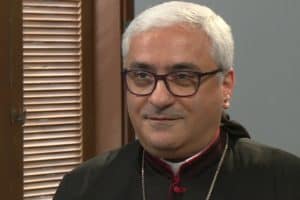Archbishop of Beirut: ‘We want to know the truth about the explosion’
LEBANON has been experiencing a series of dramatic shocks in the past year, political, economic, and most recently physical when a massive explosion did most harm to the Christian quarter. Does the international community appreciate the value of Lebanon for the Middle East? Aid to the Church in Need (ACN) interviewed Maronite Archbishop Paul Abdel Sater of Beirut.
How would you describe the emotional climate today?
The days following the blast, people were thanking God, because they were still alive; but they were also sad because they had lost loved ones. And their homes. They feel, all of them, that a miracle happened. It is true, we lost more than two hundred people and thousands were injured. But if you see the destruction, the amount of destruction, there should have been more than 200 people killed. And everyone has a story how he or she was saved, how they left the place where they should have been, as if pushed by someone—and they were saved from being killed or injured.

Afterwards people started asking the question, the obvious question, why, why did this happen? And you could feel a sense of anger, not hatred, but anger—why is it happening again? When is it going to stop? Now, people are thankful because they have been helped by other people to get back to their homes. But they keep asking the same question: why? Who did it? We want to know the truth, especially those who lost loved ones who were killed or who disappeared.
What is the Church doing practically today to help the families begin their lives again?
The parish priests have been working night and day for eight weeks. They have been visiting people and checking if they need help. We are trying to repair their damaged homes. We are also trying to provide food for them if it is needed. We undertake visits to encourage people who have been hit by the explosion to stay in their homes.
Saint John Paul II said: Lebanon is a message. If Lebanon is not able to resolve its challenges, what are the potential implications for the whole region and how important is Lebanon for this whole region?
It is true. And the proof is that on the second day after the explosion, we had people coming from all areas of Lebanon, Christians, Muslims, young people, they all worked together to clean the damaged area to help people get their things out of their destroyed homes. So, it is true, Lebanon is a message. You only find such solidarity between people in Lebanon. Now, if Lebanon loses that, it will mean that fanaticism will increase in the area. And when you have fanaticism, there is destruction, because people will not see the human person in front of them. They will see someone who is against them, their enemy, but not the human person. What’s good in Lebanon until now is that we are still able to see a person in front of us, not his ideology, not his ideas, not his convictions, but a person who needs to be loved, to be cared for. With whom can we live if this is lost?
Until now, people who wish to live in freedom were always able to come to Lebanon and experience this freedom. Sadly, I believe the international community does not appreciate the true value of Lebanon. It is rare to find it in the Middle East and it needs to be preserved by the international community.
—Mark von Riedemann & Maria Lozano

